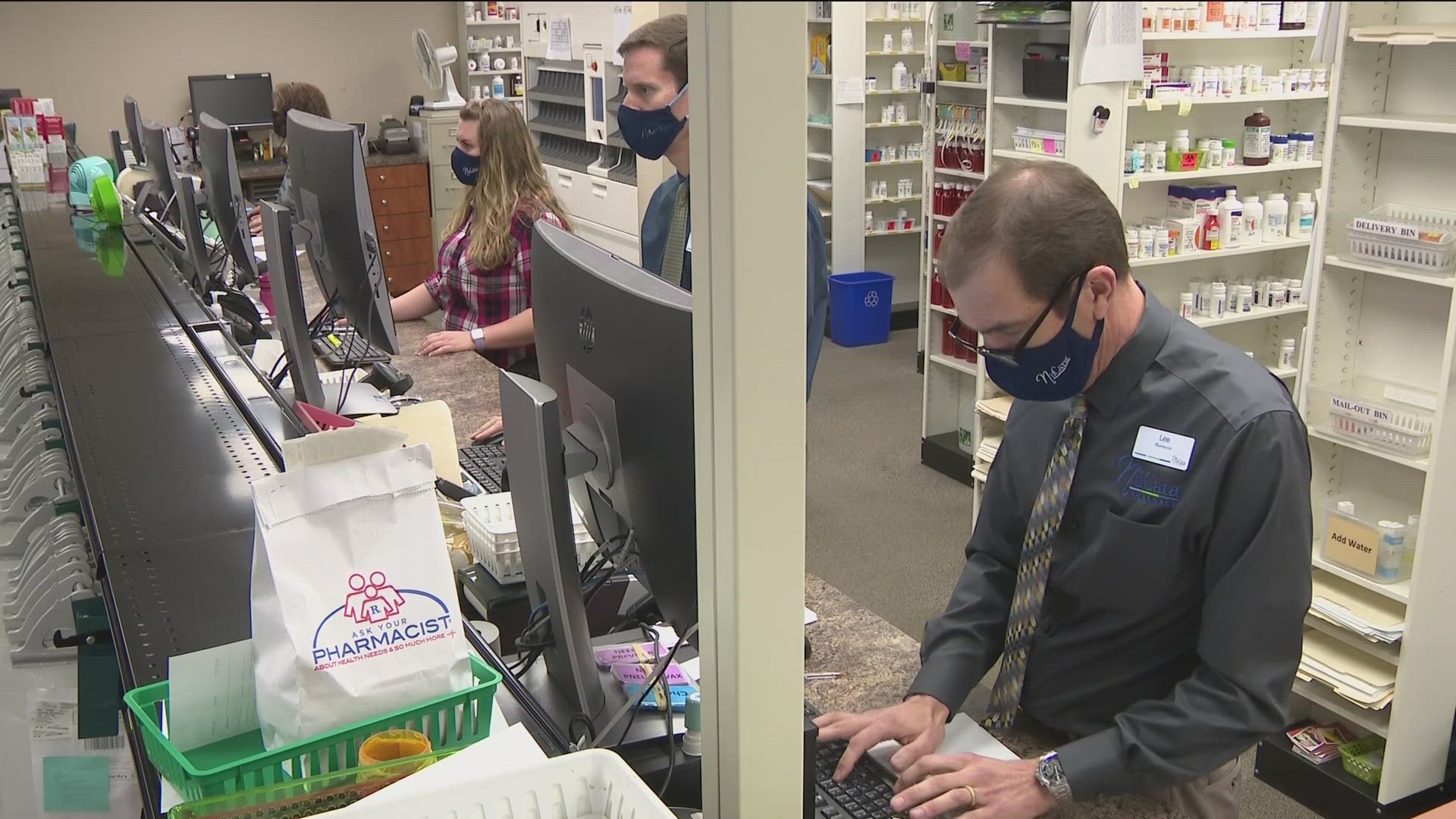ST PAUL, Minn. — Minnesota legislators are backing a bundle of bills seen as a lifeline to the state's floundering independent pharmacies that have been rocked with low reimbursement rate, and insurers steering customers away from them.
"A fair price is what we're talking about. We're not asking to wheel barrels full of gold out the front door every day," John Hoeschen, who owns St. Paul Corner Drug, told reporters Tuesday at a State Capitol news conference.
"We do need to be made whole on the cost of the drugs, and the cost of what it takes to put it together and service a patient. Right now, about 60 percent of what we dispense in my pharmacy is below water."
DFL Senators Alice Mann and John Hoffman, and DFL Rep. Kristin Bahner, are carrying bills that would in the short term boost the finances of independent pharmacies.
"We know that in rural Minnesota many people do not have multiple pharmacies to choose from, and the fact that pharmacies all over Minnesota are closing is very, very alarming," Sen. Mann, who is also a physician, asserted.
Since 2018, nearly 35 percent of all independently owned pharmacies in Minnesota have closed. During the same period, 20 percent of chain pharmacy stores have been shuttered. The result is a growing number of pharmacy deserts.
"There is currently no pharmacy within northern Minneapolis, and several neighborhoods throughout Saint Paul so the time for action is – well, a long time ago."
One of the bills would allow pharmacists and other pharmacy employees to keep giving vaccinations and administering some tests. Those were services they were authorized to do on an emergency basis during the pandemic, through the federal Public Readiness and Emergency Preparedness Act, which will expire at the end of the year.
The legislation seeks to ensure pharmacies are reimbursed fairly for providing those services.
"Our job is healthcare. We try to keep people well, right? The vaccinations are just one way to do that," said Jason Miller of Coburn's Pharmacies, who is co-chair of the Minnesota Pharmacists Association's public affairs committee.
"The reimbursement goes hand in hand with that, though. For so long pharmacists have advocated to get more authority to do more things, and now we have them, but we need to be paid as such."
Another piece of legislation would increase prescription reimbursement rates in state healthcare contracts, at a time when independent pharmacies across Minnesota are losing money filling prescriptions.
"The PBMs, Pharmacy Benefit Managers, set the price we are reimbursed; they also choose what drugs are on the formulary," Deb Keaveny of Keaveny Drug in Winsted explained.
"Unfortunately, we can't really call these contracts 'agreements' because it's basically you take it, or you leave it."
Keaveny said independent pharmacists are also losing customers due to health plans mandating patients use national mail order companies for maintenance medications.
"Many times, they steer our patients away. I call it stealing. They’ll send letters out and tell patients you can’t go to Keaveny Drug in Winsted anymore because they’re not a preferred pharmacy, so if you want to use your pharmacy benefit card you must go to a CVS, CVS mail-order, Walgreens."
Supporters of this legislation say it's not just about the tradition of preserving the American tradition of mom-and-pop drug stores. They say it's about maintaining access to health care for a lot of people who might not have any other options.
They point out many of the towns at risk becoming pharmacy deserts are already healthcare deserts, and Minnesotans make far more visits to pharmacies in general than they do to their primary care providers.
Hoeschen's customer Dave Little said he was steered to an out-of-state mail-order pharmacy that has made mistakes on his medications.
"I’ve been relying on a nurse and family members to make sure I get my correct medications, because we’ve had a problem with that through mail-order, getting the wrong drug," Little explained.
"We need our community based independent pharmacies that care about us, know us as people and not just for prescriptions."
Hoeschen said in some cases he's had to refer customers like Little to mail-order pharmacies because he can no longer afford to fill their prescriptions at the current reimbursement rates.
"We could fill it through the PBM contract, but we'd lose money on it every time, and eventually we'd close and wouldn't be able to help anyone," Hoeschen explained.
"If we’re taking a $50, $60, $70, $100 loss on one prescription, there’s no way we’re going to be there. That model doesn’t work in any business."
Hoeschen's customer Cindy Harley said she was very thankful for the personalized attention and consulting she received at St. Paul Corner Drug when she went to them for medication to treat her migraines.
"I’m beyond thankful my pharmacist educated me about the potential side effects of the medication, including brain fog and depression," Harley told reporters.
"This is because a week later, when I found myself unable to think or function and wondering if I was able to work anymore, I suddenly remembered that my pharmacist had mentioned these side effects. Because of this I was able to have my physician intervene, and I was able to change my prescription."

